Mark David Gerson's Blog, page 15
March 12, 2012
The Story Knows Best II
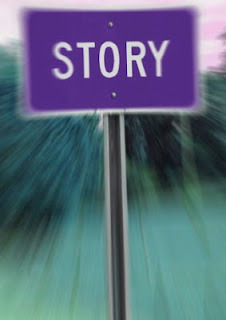 Earlier today, I offered these thoughts in response to a writer's request for feedback on a memoir piece he had written.
Earlier today, I offered these thoughts in response to a writer's request for feedback on a memoir piece he had written. With his permission, I offer a slightly edited version here, as it is the foundation of everything I believe about writing and the creative process.
It's a philosophy I express often on these pages and in the pages of The Voice of the Muse: Answering the Call to Write: "The story (whatever it is) is smarter than I am. It always knows best."
"Here's my general guidance that, I trust, will speak to your specific questions. From what I know of you through your writing and from what I sense and intuit of you through your spirit, I'm certain that it will resonate with you...
"Your story (be it a few pages or a few hundred) is its own sentient entity and its own presence. As a memoir, it may appear on the surface to be about you, which perhaps gives you the illusion that you know what it is about. However, you are simply the raw material for a story that knows far more about what it is about than you ever will.
"From that place, I urge you to listen to the story that moves through you onto the page as closely as you have come to listen to your heart, to surrender to it as completely as you are learning to surrender to your heart, and to trust it as fully as you know you must trust your heart.
 "As you are able to do those things, you will honor the heart that is singing to you and the heart of the story that is singing through it to you. And when you are done your two pages or two hundred, you will be amazed and astounded at what has been crafted through you and how you have been crafted because of it.
"As you are able to do those things, you will honor the heart that is singing to you and the heart of the story that is singing through it to you. And when you are done your two pages or two hundred, you will be amazed and astounded at what has been crafted through you and how you have been crafted because of it."I have every confidence that you can open yourself to that and every confidence, as well, that what will emerge will transform you (and others) in ways that you cannot not imagine."
Photos by Mark David Gerson: #1 Story, AK; #2 Christmas butterfly
Please "like" my Facebook pages:
• The MoonQuest movie
• The MoonQuest book
• The Voice of the Muse book
• Mark David Gerson
Published on March 12, 2012 18:12
February 29, 2012
Mark David Gerson: A Writer's Life II
This is an updated version of an interview that appeared last month at Writers Unite, an international online writers' community out of the U.K.
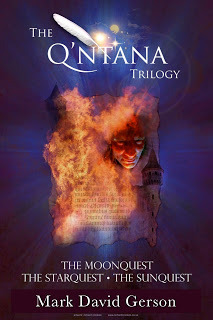 Writers Unite: Firstly, congratulations on your trilogy becoming a movie! Can you tell us about your Q'ntana Trilogy novels?
Writers Unite: Firstly, congratulations on your trilogy becoming a movie! Can you tell us about your Q'ntana Trilogy novels?
Mark David Gerson: Thanks. The Q'ntana Trilogy books consists of The MoonQuest, The StarQuest and The SunQuest. The MoonQuest takes place in Q'ntana, where stories have been banned and storytellers put to death and where the moon, saddened by the silence, has cried tears that have extinguished her light. The quest is to restore story to the land and light to the moon. Because The StarQuest and SunQuest are still in process, I'm not prepared to reveal their plots, other than to say that the evil force behind the tyranny in The MoonQuest spans all three books.
WU: Did you have any goals for this collection when you wrote it — to get published, or just to finish, etc.?
MDG: I have to give you some background before I answer the question. When I began The MoonQuest (or, rather, when The MoonQuest began me), I had no plans for a trilogy, nor did I even have a conscious desire to write a fantasy novel. In fact, I knew nothing about the story, including its title, when the first words found their way out of me onto the page. I tell a longer version of the story on my blog. In short, though, The MoonQuest birthed itself during a Toronto writing workshop I was facilitating when, in an unprecedented in-the-moment inspiration, I did the same exercise I had just presented to participants. What I wrote that evening became the opening scene of the first draft of a novel I knew nothing about. From there, I just kept writing, discovering the story as I went along, until I was done. The StarQuest and SunQuest stories emerged similarly.
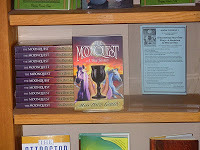 I don't remember now when I knew this would be a trilogy, but I suspect it wasn't until after I had written The MoonQuest's second draft. At that point, I knew the titles of the two subsequent books. But I had not the remotest idea what they would be about. As it turns out, Q'ntana (named after the land in which the stories are set) is not a traditional trilogy given that, for the most part, each story focuses on different characters. It's more a time-bending generational epic, with The StarQuest featuring the daughter of The MoonQuest's protagonist and The SunQuest featuring her son, although, I said above, the evil Bo'Rà K'n character is present in all three books.
I don't remember now when I knew this would be a trilogy, but I suspect it wasn't until after I had written The MoonQuest's second draft. At that point, I knew the titles of the two subsequent books. But I had not the remotest idea what they would be about. As it turns out, Q'ntana (named after the land in which the stories are set) is not a traditional trilogy given that, for the most part, each story focuses on different characters. It's more a time-bending generational epic, with The StarQuest featuring the daughter of The MoonQuest's protagonist and The SunQuest featuring her son, although, I said above, the evil Bo'Rà K'n character is present in all three books.
As for goals, I would be lying if I said I didn't care whether or not the books would be published and movies produce. But the truth is that I had to write them, regardless of outcomes or consequences. I had no more choice on my journey than did Toshar, The MoonQuest's protagonist, on his.
WU: How long did the novels take you to write?
MDG: Not only did I write each novel differently, each took a different length of time to complete.
It took me six months over the course of a year to write the first draft The MoonQuest: two three-month segments of writing broken up by six months when I didn't work on the book at all. In one of those curious synchronicities that seems to follow me around, I finished the first draft a year to the day after that Toronto writing workshop mentioned above. Although early drafts were completed in the mid- to late 1990s, the book didn't come out until 2007.
In some ways, The StarQuest was the most challenging of the three. Believing (erroneously) that I was finished with The MoonQuest, I began The StarQuest in April 1998. After two aborted attempts to complete a first draft, spread out over a decade, I finally started a new first draft in late 2008 and finished it in July 2009. Last month (February 2012), I completed what I believe to be a publisher-ready draft of the book and a production-ready draft of the screenplay.
Two things set the trilogy's third story, The SunQuest, apart. The first is that I wrote the screenplay before tackling the novel. With The MoonQuest, I sourced my screenplay adaptation from a largely complete book manuscript. For The StarQuest screenplay, I used that finally completed, ultra-chaotic first draft as my foundation. I decided to challenge myself with The SunQuest by beginning with the screenplay. Once that was done, I wrote a first draft of the novel in what for me was a record-breaking three weeks!

WU: How long have you been writing?
MDG: Perhaps the better question would be, "How long did you resist writing?" I often joke that my Muse tricked me into writing, given that for most of my early life, I resisted anything remotely creative. My first jobs out of university were in public relations, where I had to write, even if what I initially wrote was largely formulaic. However, that experience gave me the confidence to try my hand at freelance work and, before I knew it, I was a full-time (self-taught) freelance writer and editor, doing mostly magazine, newspaper, corporate and government work. It wasn't until my early 30s, when the double-whammy of a creative and spiritual awakening whacked me over the head, that I began to explore more creative avenues. And it wasn't until I was 39 that The MoonQuest, my first foray into serious creative writing, began to have its way with me. I've been hooked ever since.
WU: Did you outline, and if so, how does it help you?
MDG: Apparently, I'm congenitally unable to outline. Even when I was in high school and was required to turn in an outline with my essay, I always wrote the essay first. I then crafted the outline.
When I begin a project, I rarely know the story in advance. So far, the closest thing I've come to an outline was having The SunQuest screenplay in front of me when I wrote the novel. But there was no outline for the screenplay!
When I began The MoonQuest, as I said earlier, I knew nothing about the story, except what emerged in each day's writing. I didn't have a title until about halfway through and I had no idea of the ending until about two-thirds of the way through. It was an experience in surrender: in surrendering unconditional control to my Muse and to the story. And it was tough! It was tough to keep writing with no plot, no outline and not even the remotest clue where the story was taking me. But it taught me how to get out of the way and let the story have its way with me. That's still how I write -- regardless of the form, genre or project. Fortunately, I now do it with much less resistance than I did it on The MoonQuest. But it's still, sometimes, the most challenging aspect of the work...even as it's also the most exhilarating and is, for me, the key to the magic!
WU: What was your writing routine for the novels?
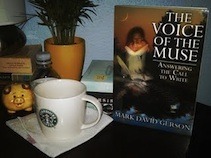 MDG: One of my so-called "rules" for writing, abridged on my website from my book on writing,
The Voice of the Muse: Answering the Call to Write
, is that there are no rules, that what works today may not work tomorrow. From that place, I have no strict routine that I have carried through from project to project.
MDG: One of my so-called "rules" for writing, abridged on my website from my book on writing,
The Voice of the Muse: Answering the Call to Write
, is that there are no rules, that what works today may not work tomorrow. From that place, I have no strict routine that I have carried through from project to project.
With the first draft of The MoonQuest, I was so stressed by this notion of surrendering to the story (despite the fact that I had been teaching that philosophy for a few years in workshops!), that I nearly always wrote first thing in the morning, often before getting out of bed. If I wrote first thing, I didn't spend the rest of the day stressing about writing!
I wrote large chunks of The Voice of the Muse: Answering the Call to Write longhand, in the car...although, to be accurate, I didn't know at the time that I was writing a book. I thought I was writing stream-of-consciousness, self-inspiration at a time when I was once again stuck on The StarQuest. A few years later, those scribblings would form the basis of The Voice of the Muse book and its companion CD, The Voice of the Muse Companion: Guided Meditations for Writers.
 When, in 2008, I began the third version of my first draft of The StarQuest, I was in a unpleasant, time-consuming job. On one hand, I had no time or energy for much other than work. On the other, I knew that writing was my only key to mental and spiritual health. I considered all the oft-written-about options for the time-challenged (writing late into the night, getting up at 4 a.m., etc.) and dismissed them all as, for me, unsustainable. In the end, I chose to set my alarm for a wake-up call 15 minutes earlier than needed and spent those 15 minutes, still in bed, working on The StarQuest. Some days I wrote a sentence, some days I wrote a paragraph. But I wrote every day. Not only did it keep me sane but when, a few months later, the job ended, the momentum I had achieved with my 15-minutes-a-day routine carried me through to completion. I finished the draft five months later.
When, in 2008, I began the third version of my first draft of The StarQuest, I was in a unpleasant, time-consuming job. On one hand, I had no time or energy for much other than work. On the other, I knew that writing was my only key to mental and spiritual health. I considered all the oft-written-about options for the time-challenged (writing late into the night, getting up at 4 a.m., etc.) and dismissed them all as, for me, unsustainable. In the end, I chose to set my alarm for a wake-up call 15 minutes earlier than needed and spent those 15 minutes, still in bed, working on The StarQuest. Some days I wrote a sentence, some days I wrote a paragraph. But I wrote every day. Not only did it keep me sane but when, a few months later, the job ended, the momentum I had achieved with my 15-minutes-a-day routine carried me through to completion. I finished the draft five months later.
With The SunQuest, I felt so driven that I wrote all day every day, six or seven days a week, during the three weeks it took me to complete that first draft. It was November (2011), so I used NaNoWriMo to help motivate me.
A few days after that SunQuest draft was finished, I returned to a memoir manuscript (Acts of Surrender) and, apparently still in that passionate/obsessive flow, finished that first draft, too...also in three weeks.
WU: Has your life changed in anyway since writing the novels?
 MDG: That's a hard question to answer. Nothing about my life is constant. Everything is in unending transition and transformation. While writing is very much a part of that, I'm not sure I can attach particular changes to particular writing projects. I can say, though, that writing The MoonQuest in that day-to-day, in-the-moment fashion freed me to live my life more in that way. Without The MoonQuest, for example, I probably wouldn't now be living in the U.S. I certainly wouldn't be a father.
MDG: That's a hard question to answer. Nothing about my life is constant. Everything is in unending transition and transformation. While writing is very much a part of that, I'm not sure I can attach particular changes to particular writing projects. I can say, though, that writing The MoonQuest in that day-to-day, in-the-moment fashion freed me to live my life more in that way. Without The MoonQuest, for example, I probably wouldn't now be living in the U.S. I certainly wouldn't be a father.
WU: How much of the book is realistic?
MDG: The MoonQuest is subtitled "a true fantasy," but not because it's conventionally realistic. Set in a mythical time and place, and in a land with two suns and a hidden moon, it can hardly be said to be an accurate representation of any real place.
The architect Frank Lloyd Wright once said that "the truth is more important than facts" and I wholeheartedly agree with that. For me, the notion of "true fantasy" is about the concept of fiction speaking to deeper truths than fact ever can. Although The MoonQuest is not an objectively true story, it is a story about larger truths.
In one sense, there is no such thing as objective fact. Even history -- supposedly a delineation of facts -- is always colored by those who put it forth. You know the saying, "history is always written by the winners." Even something as apparently factual as your birthday falls on different days depending on which calendar calculates it (ie, Gregorian, Jewish, Muslim, Chinese, Julian, etc.).
However, the human heart at its deepest levels always speaks truth. That's where our most powerful stories come from. That's where our truth resides.
WU: What is the message in your book?
 MDG: I don't believe in consciously writing "message books"...even though I have an ebook titled The Book of Messages! Not only did I not know the story as I was writing the three books in The Q'ntana Trilogy, I was also unconscious of their themes. Yet, the themes are there...for in surrendering to the superior wisdom of the books, I freed the stories to delineate and illuminate their own themes, without any interference from me. The obvious themes in The MoonQuest involve censorship, including self-censorship, freedom of expression, transcending creative blocks, and surrender...the same type of surrender I used in getting the book onto the page. Again, I knew none of that during the writing and, I believe, that that's just as well. By letting the themes emerge as organically as the story did, they are (I hope) not at all heavy-handed and integrate well with the plot.
MDG: I don't believe in consciously writing "message books"...even though I have an ebook titled The Book of Messages! Not only did I not know the story as I was writing the three books in The Q'ntana Trilogy, I was also unconscious of their themes. Yet, the themes are there...for in surrendering to the superior wisdom of the books, I freed the stories to delineate and illuminate their own themes, without any interference from me. The obvious themes in The MoonQuest involve censorship, including self-censorship, freedom of expression, transcending creative blocks, and surrender...the same type of surrender I used in getting the book onto the page. Again, I knew none of that during the writing and, I believe, that that's just as well. By letting the themes emerge as organically as the story did, they are (I hope) not at all heavy-handed and integrate well with the plot.
But there are other themes as well, ones readers discover and share that I knew nothing about. Those are the most exciting for me, as they reveal the book as a living organism that exists independent of me.
WU: What are your readers' reactions to it?
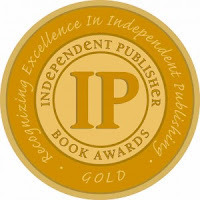 MDG: Although winning awards and getting great reviews for both The MoonQuest and The Voice of the Muse have been tremendously gratifying and validating, and although having a producer primed to turn the trilogy into a series of feature films is fabulously exciting, what's most rewarding is when individual readers tell me how one or both of my books has affected them and, in some cases, changed their lives. This moving video, for example, was sent to me by one of my readers. And I have equally wonderful testimonials for both books on my website and on Amazon
MDG: Although winning awards and getting great reviews for both The MoonQuest and The Voice of the Muse have been tremendously gratifying and validating, and although having a producer primed to turn the trilogy into a series of feature films is fabulously exciting, what's most rewarding is when individual readers tell me how one or both of my books has affected them and, in some cases, changed their lives. This moving video, for example, was sent to me by one of my readers. And I have equally wonderful testimonials for both books on my website and on Amazon .
.
WU: Where can readers find your books and learn more about you and your work?
MDG: Hard-copy editions of The MoonQuest, The Voice of the Muse and The Voice of the Muse Companion are available on my website and Amazon.com . Both books are also sold as ebooks for Kindle, Nook, iBook and Kobo. A downloadable version of the The Voice of the Muse Companion CD is available at CD Baby and on Facebook.
. Both books are also sold as ebooks for Kindle, Nook, iBook and Kobo. A downloadable version of the The Voice of the Muse Companion CD is available at CD Baby and on Facebook.
For more about the full Q'ntana Trilogy, books and movies, click here.
You can also find me on my website and blog, as well as on YouTube, Facebook, Pinterest, and Google+.
Please "like" these Facebook pages...
• The Voice of the Muse book
• The MoonQuest movie
• The MoonQuest book
• Mark David Gerson
 Writers Unite: Firstly, congratulations on your trilogy becoming a movie! Can you tell us about your Q'ntana Trilogy novels?
Writers Unite: Firstly, congratulations on your trilogy becoming a movie! Can you tell us about your Q'ntana Trilogy novels?Mark David Gerson: Thanks. The Q'ntana Trilogy books consists of The MoonQuest, The StarQuest and The SunQuest. The MoonQuest takes place in Q'ntana, where stories have been banned and storytellers put to death and where the moon, saddened by the silence, has cried tears that have extinguished her light. The quest is to restore story to the land and light to the moon. Because The StarQuest and SunQuest are still in process, I'm not prepared to reveal their plots, other than to say that the evil force behind the tyranny in The MoonQuest spans all three books.
WU: Did you have any goals for this collection when you wrote it — to get published, or just to finish, etc.?
MDG: I have to give you some background before I answer the question. When I began The MoonQuest (or, rather, when The MoonQuest began me), I had no plans for a trilogy, nor did I even have a conscious desire to write a fantasy novel. In fact, I knew nothing about the story, including its title, when the first words found their way out of me onto the page. I tell a longer version of the story on my blog. In short, though, The MoonQuest birthed itself during a Toronto writing workshop I was facilitating when, in an unprecedented in-the-moment inspiration, I did the same exercise I had just presented to participants. What I wrote that evening became the opening scene of the first draft of a novel I knew nothing about. From there, I just kept writing, discovering the story as I went along, until I was done. The StarQuest and SunQuest stories emerged similarly.
 I don't remember now when I knew this would be a trilogy, but I suspect it wasn't until after I had written The MoonQuest's second draft. At that point, I knew the titles of the two subsequent books. But I had not the remotest idea what they would be about. As it turns out, Q'ntana (named after the land in which the stories are set) is not a traditional trilogy given that, for the most part, each story focuses on different characters. It's more a time-bending generational epic, with The StarQuest featuring the daughter of The MoonQuest's protagonist and The SunQuest featuring her son, although, I said above, the evil Bo'Rà K'n character is present in all three books.
I don't remember now when I knew this would be a trilogy, but I suspect it wasn't until after I had written The MoonQuest's second draft. At that point, I knew the titles of the two subsequent books. But I had not the remotest idea what they would be about. As it turns out, Q'ntana (named after the land in which the stories are set) is not a traditional trilogy given that, for the most part, each story focuses on different characters. It's more a time-bending generational epic, with The StarQuest featuring the daughter of The MoonQuest's protagonist and The SunQuest featuring her son, although, I said above, the evil Bo'Rà K'n character is present in all three books.As for goals, I would be lying if I said I didn't care whether or not the books would be published and movies produce. But the truth is that I had to write them, regardless of outcomes or consequences. I had no more choice on my journey than did Toshar, The MoonQuest's protagonist, on his.
WU: How long did the novels take you to write?
MDG: Not only did I write each novel differently, each took a different length of time to complete.
It took me six months over the course of a year to write the first draft The MoonQuest: two three-month segments of writing broken up by six months when I didn't work on the book at all. In one of those curious synchronicities that seems to follow me around, I finished the first draft a year to the day after that Toronto writing workshop mentioned above. Although early drafts were completed in the mid- to late 1990s, the book didn't come out until 2007.
In some ways, The StarQuest was the most challenging of the three. Believing (erroneously) that I was finished with The MoonQuest, I began The StarQuest in April 1998. After two aborted attempts to complete a first draft, spread out over a decade, I finally started a new first draft in late 2008 and finished it in July 2009. Last month (February 2012), I completed what I believe to be a publisher-ready draft of the book and a production-ready draft of the screenplay.
Two things set the trilogy's third story, The SunQuest, apart. The first is that I wrote the screenplay before tackling the novel. With The MoonQuest, I sourced my screenplay adaptation from a largely complete book manuscript. For The StarQuest screenplay, I used that finally completed, ultra-chaotic first draft as my foundation. I decided to challenge myself with The SunQuest by beginning with the screenplay. Once that was done, I wrote a first draft of the novel in what for me was a record-breaking three weeks!

WU: How long have you been writing?
MDG: Perhaps the better question would be, "How long did you resist writing?" I often joke that my Muse tricked me into writing, given that for most of my early life, I resisted anything remotely creative. My first jobs out of university were in public relations, where I had to write, even if what I initially wrote was largely formulaic. However, that experience gave me the confidence to try my hand at freelance work and, before I knew it, I was a full-time (self-taught) freelance writer and editor, doing mostly magazine, newspaper, corporate and government work. It wasn't until my early 30s, when the double-whammy of a creative and spiritual awakening whacked me over the head, that I began to explore more creative avenues. And it wasn't until I was 39 that The MoonQuest, my first foray into serious creative writing, began to have its way with me. I've been hooked ever since.
WU: Did you outline, and if so, how does it help you?
MDG: Apparently, I'm congenitally unable to outline. Even when I was in high school and was required to turn in an outline with my essay, I always wrote the essay first. I then crafted the outline.
When I begin a project, I rarely know the story in advance. So far, the closest thing I've come to an outline was having The SunQuest screenplay in front of me when I wrote the novel. But there was no outline for the screenplay!
When I began The MoonQuest, as I said earlier, I knew nothing about the story, except what emerged in each day's writing. I didn't have a title until about halfway through and I had no idea of the ending until about two-thirds of the way through. It was an experience in surrender: in surrendering unconditional control to my Muse and to the story. And it was tough! It was tough to keep writing with no plot, no outline and not even the remotest clue where the story was taking me. But it taught me how to get out of the way and let the story have its way with me. That's still how I write -- regardless of the form, genre or project. Fortunately, I now do it with much less resistance than I did it on The MoonQuest. But it's still, sometimes, the most challenging aspect of the work...even as it's also the most exhilarating and is, for me, the key to the magic!
WU: What was your writing routine for the novels?
 MDG: One of my so-called "rules" for writing, abridged on my website from my book on writing,
The Voice of the Muse: Answering the Call to Write
, is that there are no rules, that what works today may not work tomorrow. From that place, I have no strict routine that I have carried through from project to project.
MDG: One of my so-called "rules" for writing, abridged on my website from my book on writing,
The Voice of the Muse: Answering the Call to Write
, is that there are no rules, that what works today may not work tomorrow. From that place, I have no strict routine that I have carried through from project to project.With the first draft of The MoonQuest, I was so stressed by this notion of surrendering to the story (despite the fact that I had been teaching that philosophy for a few years in workshops!), that I nearly always wrote first thing in the morning, often before getting out of bed. If I wrote first thing, I didn't spend the rest of the day stressing about writing!
I wrote large chunks of The Voice of the Muse: Answering the Call to Write longhand, in the car...although, to be accurate, I didn't know at the time that I was writing a book. I thought I was writing stream-of-consciousness, self-inspiration at a time when I was once again stuck on The StarQuest. A few years later, those scribblings would form the basis of The Voice of the Muse book and its companion CD, The Voice of the Muse Companion: Guided Meditations for Writers.
 When, in 2008, I began the third version of my first draft of The StarQuest, I was in a unpleasant, time-consuming job. On one hand, I had no time or energy for much other than work. On the other, I knew that writing was my only key to mental and spiritual health. I considered all the oft-written-about options for the time-challenged (writing late into the night, getting up at 4 a.m., etc.) and dismissed them all as, for me, unsustainable. In the end, I chose to set my alarm for a wake-up call 15 minutes earlier than needed and spent those 15 minutes, still in bed, working on The StarQuest. Some days I wrote a sentence, some days I wrote a paragraph. But I wrote every day. Not only did it keep me sane but when, a few months later, the job ended, the momentum I had achieved with my 15-minutes-a-day routine carried me through to completion. I finished the draft five months later.
When, in 2008, I began the third version of my first draft of The StarQuest, I was in a unpleasant, time-consuming job. On one hand, I had no time or energy for much other than work. On the other, I knew that writing was my only key to mental and spiritual health. I considered all the oft-written-about options for the time-challenged (writing late into the night, getting up at 4 a.m., etc.) and dismissed them all as, for me, unsustainable. In the end, I chose to set my alarm for a wake-up call 15 minutes earlier than needed and spent those 15 minutes, still in bed, working on The StarQuest. Some days I wrote a sentence, some days I wrote a paragraph. But I wrote every day. Not only did it keep me sane but when, a few months later, the job ended, the momentum I had achieved with my 15-minutes-a-day routine carried me through to completion. I finished the draft five months later.With The SunQuest, I felt so driven that I wrote all day every day, six or seven days a week, during the three weeks it took me to complete that first draft. It was November (2011), so I used NaNoWriMo to help motivate me.
A few days after that SunQuest draft was finished, I returned to a memoir manuscript (Acts of Surrender) and, apparently still in that passionate/obsessive flow, finished that first draft, too...also in three weeks.
WU: Has your life changed in anyway since writing the novels?
 MDG: That's a hard question to answer. Nothing about my life is constant. Everything is in unending transition and transformation. While writing is very much a part of that, I'm not sure I can attach particular changes to particular writing projects. I can say, though, that writing The MoonQuest in that day-to-day, in-the-moment fashion freed me to live my life more in that way. Without The MoonQuest, for example, I probably wouldn't now be living in the U.S. I certainly wouldn't be a father.
MDG: That's a hard question to answer. Nothing about my life is constant. Everything is in unending transition and transformation. While writing is very much a part of that, I'm not sure I can attach particular changes to particular writing projects. I can say, though, that writing The MoonQuest in that day-to-day, in-the-moment fashion freed me to live my life more in that way. Without The MoonQuest, for example, I probably wouldn't now be living in the U.S. I certainly wouldn't be a father. WU: How much of the book is realistic?
MDG: The MoonQuest is subtitled "a true fantasy," but not because it's conventionally realistic. Set in a mythical time and place, and in a land with two suns and a hidden moon, it can hardly be said to be an accurate representation of any real place.
The architect Frank Lloyd Wright once said that "the truth is more important than facts" and I wholeheartedly agree with that. For me, the notion of "true fantasy" is about the concept of fiction speaking to deeper truths than fact ever can. Although The MoonQuest is not an objectively true story, it is a story about larger truths.
In one sense, there is no such thing as objective fact. Even history -- supposedly a delineation of facts -- is always colored by those who put it forth. You know the saying, "history is always written by the winners." Even something as apparently factual as your birthday falls on different days depending on which calendar calculates it (ie, Gregorian, Jewish, Muslim, Chinese, Julian, etc.).
However, the human heart at its deepest levels always speaks truth. That's where our most powerful stories come from. That's where our truth resides.
WU: What is the message in your book?
 MDG: I don't believe in consciously writing "message books"...even though I have an ebook titled The Book of Messages! Not only did I not know the story as I was writing the three books in The Q'ntana Trilogy, I was also unconscious of their themes. Yet, the themes are there...for in surrendering to the superior wisdom of the books, I freed the stories to delineate and illuminate their own themes, without any interference from me. The obvious themes in The MoonQuest involve censorship, including self-censorship, freedom of expression, transcending creative blocks, and surrender...the same type of surrender I used in getting the book onto the page. Again, I knew none of that during the writing and, I believe, that that's just as well. By letting the themes emerge as organically as the story did, they are (I hope) not at all heavy-handed and integrate well with the plot.
MDG: I don't believe in consciously writing "message books"...even though I have an ebook titled The Book of Messages! Not only did I not know the story as I was writing the three books in The Q'ntana Trilogy, I was also unconscious of their themes. Yet, the themes are there...for in surrendering to the superior wisdom of the books, I freed the stories to delineate and illuminate their own themes, without any interference from me. The obvious themes in The MoonQuest involve censorship, including self-censorship, freedom of expression, transcending creative blocks, and surrender...the same type of surrender I used in getting the book onto the page. Again, I knew none of that during the writing and, I believe, that that's just as well. By letting the themes emerge as organically as the story did, they are (I hope) not at all heavy-handed and integrate well with the plot.But there are other themes as well, ones readers discover and share that I knew nothing about. Those are the most exciting for me, as they reveal the book as a living organism that exists independent of me.
WU: What are your readers' reactions to it?
 MDG: Although winning awards and getting great reviews for both The MoonQuest and The Voice of the Muse have been tremendously gratifying and validating, and although having a producer primed to turn the trilogy into a series of feature films is fabulously exciting, what's most rewarding is when individual readers tell me how one or both of my books has affected them and, in some cases, changed their lives. This moving video, for example, was sent to me by one of my readers. And I have equally wonderful testimonials for both books on my website and on Amazon
MDG: Although winning awards and getting great reviews for both The MoonQuest and The Voice of the Muse have been tremendously gratifying and validating, and although having a producer primed to turn the trilogy into a series of feature films is fabulously exciting, what's most rewarding is when individual readers tell me how one or both of my books has affected them and, in some cases, changed their lives. This moving video, for example, was sent to me by one of my readers. And I have equally wonderful testimonials for both books on my website and on Amazon .
.WU: Where can readers find your books and learn more about you and your work?
MDG: Hard-copy editions of The MoonQuest, The Voice of the Muse and The Voice of the Muse Companion are available on my website and Amazon.com
 . Both books are also sold as ebooks for Kindle, Nook, iBook and Kobo. A downloadable version of the The Voice of the Muse Companion CD is available at CD Baby and on Facebook.
. Both books are also sold as ebooks for Kindle, Nook, iBook and Kobo. A downloadable version of the The Voice of the Muse Companion CD is available at CD Baby and on Facebook.For more about the full Q'ntana Trilogy, books and movies, click here.
You can also find me on my website and blog, as well as on YouTube, Facebook, Pinterest, and Google+.
Please "like" these Facebook pages...
• The Voice of the Muse book
• The MoonQuest movie
• The MoonQuest book
• Mark David Gerson
Published on February 29, 2012 23:01
February 26, 2012
Be Inspired: Getting Started II
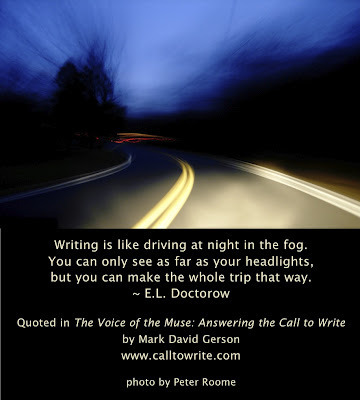
"Writing is like driving at night in the fog. You can only see as far as your headlights, but you can make the whole trip that way."~ E.L. Doctorow

Doctorow quote from...
The Voice of the Muse: Answering the Call to Write
("Getting Started" Section)
Photo: Peter Roome
Published on February 26, 2012 21:11
February 20, 2012
Acts of Surrender 25: The Past is Passed
An excerpt from Acts of Surrender: A Journey to the Other Side of Fear, my memoir-in-progress.
 "Writing is alchemy...truly a tool of wizards, witches and sorcerers. It's the magic wand, the incantation, the wave of the hand that transforms all..."
"Writing is alchemy...truly a tool of wizards, witches and sorcerers. It's the magic wand, the incantation, the wave of the hand that transforms all..."
~ The Voice of the Muse: Answering the Call to Write
One of the joys and sometime frustrations of writing from a place of deep surrender, I have found, is that the lessons of my words continue to echo in my life long after they were penned and published.
This seems particularly true of The MoonQuest , which, somehow through the miracle of that process, still regularly offers me reminders of its wisdom. If a few weeks ago it was about fear's sticky presence in my life, today it's about how the weighty baggage of the past can throw me back into doubts and second-guessing, can prevent me from moving forward...from taking off.
Last night, through the weird serendipity of the Internet, I learned about the death in January of a man who had once been a close friend. I met J. when we were both in our 20s, at the Montreal gay Jewish group that was so integral to my coming-out process in the more restrictive 1970s. After a brief mutual attraction that went nowhere, we became good friends. That friendship survived relocations and emotional turbulence but foundered on the shoals of one major life change: In 1998 I fell in love with a woman and got married. Although my other gay friends were initially confused, they quickly rallied, wishing me happiness in this unexpected turn in my life. J., however, seemed to view it as a betrayal of my gayness. We never spoke again.
I thought about J. off and on over the years. I even Googled him a handful of times. But his web presence was minimal and I never found a way of making contact...not that I'm certain I would have reached out had the option been available.
 Last night, to help satisfy my addiction to the new Pinterest social network, I was online searching for a photo of the Toronto café that J. once held the franchise for. One of my Pinterest boards is titled
Favorite/Storied Cafés
, and his downtown Second Cup outlet, around the corner from my first Toronto apartment, definitely fell into that category. What I found instead was a photo of J., attached to a weeks-old obituary. He had died January 27 of an unspecified illness.
Last night, to help satisfy my addiction to the new Pinterest social network, I was online searching for a photo of the Toronto café that J. once held the franchise for. One of my Pinterest boards is titled
Favorite/Storied Cafés
, and his downtown Second Cup outlet, around the corner from my first Toronto apartment, definitely fell into that category. What I found instead was a photo of J., attached to a weeks-old obituary. He had died January 27 of an unspecified illness.
I was stunned...for many reasons.
Although I've experienced much death in my life, and from an early age, this was the first death of a contemporary at an age (mine, 57) when I'm increasingly aware of mortality. Both my parents died young; my father (though he wasn't my natural father) at 56; my mother at 61, J.'s age.
So of course, J.'s passing reminded me of the march of time, not a bad thing, and of the importance of focusing on what's important. I know little about J.'s life since our last conversation in 81998, so I can't know whether he, like my mother, died with the regrets of an unfulfilled life. I hope not. I do know that in my more centered moments, I have no such regrets. I've done my best to follow my heart and live my passions, to be true to the highest imperatives I can touch and to walk the talk of my writing, coaching and public speaking. If I were to die tomorrow, I would like to think that I would be able to look back with satisfaction over a life lived both transparently and authentically.
That's the theory. In fact, J.'s death prompted a different kind of life review, one filled with doubts, angers, fears, resentments and a renewed clinging to a past I thought I had long ago jettisoned. As the evening wore on into a sleepless night, my mind dredged up more and more images, emotions and incidents from those past lifetimes of mine, each memory drenched in a level of anxiety I never encountered in the full-time life review involved in writing this memoir.
You could say that it's normal for the death of a close friend to spark such introspection and retrospection, and I would agree. But J. had not been a close friend for nearly two decades. Our once intertwined lives had already begun their unraveling when I left Toronto for Nova Scotia in 1994.
As I write these words, I see something I hadn't noticed before: that J. was an integral part of my adult life through the period leading up to my creative and spiritual awakening. That's not to diminish J.'s spirituality, which was certainly present. But my spirituality moved off in different directions from his, and my life moved off with it.
What I have been reliving in the 18 hours since learning of J.'s death is an early adult life devoid of conscious creativity, conscious spirituality and conscious surrender...a simpler life in many respects, though one infinitely less fulfilled. What I've been mourning through the night, even more than J.'s death, is the death of that earlier life, of those old places within me that J. represented.
A large piece of that Mark David Gerson died with J. It was a piece that I didn't even know still lived inside me; I'm startled to discover just how big that piece was.
 What does this have to do with
The MoonQuest
? There's a coronation scene in the novel where Crown Prince Kyri is directed to throw all the jeweled accoutrements of the old king's regalia into the fire as he and his subjects-to-be chant, "The past is passed. We let it go." Only when Kyri stands naked before the crowd, with all that could encumber him to his father's reign consumed in the ceremonial flame, can he begin to chart his own course as monarch...can he truly begin his own life.
What does this have to do with
The MoonQuest
? There's a coronation scene in the novel where Crown Prince Kyri is directed to throw all the jeweled accoutrements of the old king's regalia into the fire as he and his subjects-to-be chant, "The past is passed. We let it go." Only when Kyri stands naked before the crowd, with all that could encumber him to his father's reign consumed in the ceremonial flame, can he begin to chart his own course as monarch...can he truly begin his own life.
It has taken me the full 18 hours since learning of J.'s death to realize that I must build a similar pyre for the remnants of my old life. While I celebrate J.'s life and his place in mine, I can neither dwell on it nor worship it.
In that same MoonQuest scene, the newly crowned Kyri refuses to let his father, who has abdicated in his favor, kneel before him. Instead, Kyri drops to his knees, to Fortas's discomfort. Softly, so that the crowd cannot hear him, Fortas urges his son to his feet.
 P.S. Last night, inspired by a graphic I saw on a Facebook friend's Timeline, I grafted the caption "ready for take-off" onto an image of an airplane soaring into the sky. I already knew about J.'s passing but made no conscious connection between it and the creation of a new wallpaper for my cell phone. Only in writing this piece do I realize that J. and all I allowed him to represent in my life is baggage that exceeds my allotted allowance. I cannot take off until I lighten my load. The past is passed. I let it go.
P.S. Last night, inspired by a graphic I saw on a Facebook friend's Timeline, I grafted the caption "ready for take-off" onto an image of an airplane soaring into the sky. I already knew about J.'s passing but made no conscious connection between it and the creation of a new wallpaper for my cell phone. Only in writing this piece do I realize that J. and all I allowed him to represent in my life is baggage that exceeds my allotted allowance. I cannot take off until I lighten my load. The past is passed. I let it go.
One final note: After all these years of writing (I began The MoonQuest in 1994), I shouldn't still be surprised by its alchemical power in my life. Only by writing these words this morning have I come to understand why J.'s death so overwhelmed me. As I wrote in the epigraph to The Voice of the Muse: Answering the Call to Write, another book whose gifts continue to follow me: "Writing is alchemy...truly a tool of wizards, witches and sorcerers. It's the magic wand, the incantation, the wave of the hand that transforms all..."
in 1994), I shouldn't still be surprised by its alchemical power in my life. Only by writing these words this morning have I come to understand why J.'s death so overwhelmed me. As I wrote in the epigraph to The Voice of the Muse: Answering the Call to Write, another book whose gifts continue to follow me: "Writing is alchemy...truly a tool of wizards, witches and sorcerers. It's the magic wand, the incantation, the wave of the hand that transforms all..."
The past is passed. I let it go.
Please "like" these Facebook pages...
• The Voice of the Muse book
• The MoonQuest movie
• The MoonQuest book
• Mark David Gerson
 "Writing is alchemy...truly a tool of wizards, witches and sorcerers. It's the magic wand, the incantation, the wave of the hand that transforms all..."
"Writing is alchemy...truly a tool of wizards, witches and sorcerers. It's the magic wand, the incantation, the wave of the hand that transforms all..."~ The Voice of the Muse: Answering the Call to Write
One of the joys and sometime frustrations of writing from a place of deep surrender, I have found, is that the lessons of my words continue to echo in my life long after they were penned and published.
This seems particularly true of The MoonQuest , which, somehow through the miracle of that process, still regularly offers me reminders of its wisdom. If a few weeks ago it was about fear's sticky presence in my life, today it's about how the weighty baggage of the past can throw me back into doubts and second-guessing, can prevent me from moving forward...from taking off.
Last night, through the weird serendipity of the Internet, I learned about the death in January of a man who had once been a close friend. I met J. when we were both in our 20s, at the Montreal gay Jewish group that was so integral to my coming-out process in the more restrictive 1970s. After a brief mutual attraction that went nowhere, we became good friends. That friendship survived relocations and emotional turbulence but foundered on the shoals of one major life change: In 1998 I fell in love with a woman and got married. Although my other gay friends were initially confused, they quickly rallied, wishing me happiness in this unexpected turn in my life. J., however, seemed to view it as a betrayal of my gayness. We never spoke again.
I thought about J. off and on over the years. I even Googled him a handful of times. But his web presence was minimal and I never found a way of making contact...not that I'm certain I would have reached out had the option been available.
 Last night, to help satisfy my addiction to the new Pinterest social network, I was online searching for a photo of the Toronto café that J. once held the franchise for. One of my Pinterest boards is titled
Favorite/Storied Cafés
, and his downtown Second Cup outlet, around the corner from my first Toronto apartment, definitely fell into that category. What I found instead was a photo of J., attached to a weeks-old obituary. He had died January 27 of an unspecified illness.
Last night, to help satisfy my addiction to the new Pinterest social network, I was online searching for a photo of the Toronto café that J. once held the franchise for. One of my Pinterest boards is titled
Favorite/Storied Cafés
, and his downtown Second Cup outlet, around the corner from my first Toronto apartment, definitely fell into that category. What I found instead was a photo of J., attached to a weeks-old obituary. He had died January 27 of an unspecified illness.I was stunned...for many reasons.
Although I've experienced much death in my life, and from an early age, this was the first death of a contemporary at an age (mine, 57) when I'm increasingly aware of mortality. Both my parents died young; my father (though he wasn't my natural father) at 56; my mother at 61, J.'s age.
So of course, J.'s passing reminded me of the march of time, not a bad thing, and of the importance of focusing on what's important. I know little about J.'s life since our last conversation in 81998, so I can't know whether he, like my mother, died with the regrets of an unfulfilled life. I hope not. I do know that in my more centered moments, I have no such regrets. I've done my best to follow my heart and live my passions, to be true to the highest imperatives I can touch and to walk the talk of my writing, coaching and public speaking. If I were to die tomorrow, I would like to think that I would be able to look back with satisfaction over a life lived both transparently and authentically.
That's the theory. In fact, J.'s death prompted a different kind of life review, one filled with doubts, angers, fears, resentments and a renewed clinging to a past I thought I had long ago jettisoned. As the evening wore on into a sleepless night, my mind dredged up more and more images, emotions and incidents from those past lifetimes of mine, each memory drenched in a level of anxiety I never encountered in the full-time life review involved in writing this memoir.
You could say that it's normal for the death of a close friend to spark such introspection and retrospection, and I would agree. But J. had not been a close friend for nearly two decades. Our once intertwined lives had already begun their unraveling when I left Toronto for Nova Scotia in 1994.
As I write these words, I see something I hadn't noticed before: that J. was an integral part of my adult life through the period leading up to my creative and spiritual awakening. That's not to diminish J.'s spirituality, which was certainly present. But my spirituality moved off in different directions from his, and my life moved off with it.
What I have been reliving in the 18 hours since learning of J.'s death is an early adult life devoid of conscious creativity, conscious spirituality and conscious surrender...a simpler life in many respects, though one infinitely less fulfilled. What I've been mourning through the night, even more than J.'s death, is the death of that earlier life, of those old places within me that J. represented.
A large piece of that Mark David Gerson died with J. It was a piece that I didn't even know still lived inside me; I'm startled to discover just how big that piece was.
 What does this have to do with
The MoonQuest
? There's a coronation scene in the novel where Crown Prince Kyri is directed to throw all the jeweled accoutrements of the old king's regalia into the fire as he and his subjects-to-be chant, "The past is passed. We let it go." Only when Kyri stands naked before the crowd, with all that could encumber him to his father's reign consumed in the ceremonial flame, can he begin to chart his own course as monarch...can he truly begin his own life.
What does this have to do with
The MoonQuest
? There's a coronation scene in the novel where Crown Prince Kyri is directed to throw all the jeweled accoutrements of the old king's regalia into the fire as he and his subjects-to-be chant, "The past is passed. We let it go." Only when Kyri stands naked before the crowd, with all that could encumber him to his father's reign consumed in the ceremonial flame, can he begin to chart his own course as monarch...can he truly begin his own life.It has taken me the full 18 hours since learning of J.'s death to realize that I must build a similar pyre for the remnants of my old life. While I celebrate J.'s life and his place in mine, I can neither dwell on it nor worship it.
In that same MoonQuest scene, the newly crowned Kyri refuses to let his father, who has abdicated in his favor, kneel before him. Instead, Kyri drops to his knees, to Fortas's discomfort. Softly, so that the crowd cannot hear him, Fortas urges his son to his feet.
"Do not bow to me, my son. I stand here as the past, and you must never worship the past. Honor me...by living your reign, by learning the lessons I could not. You called me 'my lord.' The past is not your lord. Set your sights on the future, my son, my king. Set your sights on the future by seeing to the present. Don't, I beg, let your vision linger longingly on the past. Let it go, my son. Let it all go." He embraced Kyri then held him at arm's length before releasing him. "Let me go." Then...not looking back, [he] walked through the archway and out of the castle.Kyri never forgot his formative experiences with his father, nor will I forget mine with J. I will also not forget J.'s generosity, warm-heartedness and compassion, or the loving friendship we once shared. At the same time, that lifetime in my life is over, as J.'s death eloquently reminds me. The past is passed. It's time to let it go.
 P.S. Last night, inspired by a graphic I saw on a Facebook friend's Timeline, I grafted the caption "ready for take-off" onto an image of an airplane soaring into the sky. I already knew about J.'s passing but made no conscious connection between it and the creation of a new wallpaper for my cell phone. Only in writing this piece do I realize that J. and all I allowed him to represent in my life is baggage that exceeds my allotted allowance. I cannot take off until I lighten my load. The past is passed. I let it go.
P.S. Last night, inspired by a graphic I saw on a Facebook friend's Timeline, I grafted the caption "ready for take-off" onto an image of an airplane soaring into the sky. I already knew about J.'s passing but made no conscious connection between it and the creation of a new wallpaper for my cell phone. Only in writing this piece do I realize that J. and all I allowed him to represent in my life is baggage that exceeds my allotted allowance. I cannot take off until I lighten my load. The past is passed. I let it go.One final note: After all these years of writing (I began The MoonQuest
 in 1994), I shouldn't still be surprised by its alchemical power in my life. Only by writing these words this morning have I come to understand why J.'s death so overwhelmed me. As I wrote in the epigraph to The Voice of the Muse: Answering the Call to Write, another book whose gifts continue to follow me: "Writing is alchemy...truly a tool of wizards, witches and sorcerers. It's the magic wand, the incantation, the wave of the hand that transforms all..."
in 1994), I shouldn't still be surprised by its alchemical power in my life. Only by writing these words this morning have I come to understand why J.'s death so overwhelmed me. As I wrote in the epigraph to The Voice of the Muse: Answering the Call to Write, another book whose gifts continue to follow me: "Writing is alchemy...truly a tool of wizards, witches and sorcerers. It's the magic wand, the incantation, the wave of the hand that transforms all..."The past is passed. I let it go.
Please "like" these Facebook pages...
• The Voice of the Muse book
• The MoonQuest movie
• The MoonQuest book
• Mark David Gerson
Published on February 20, 2012 08:11
February 14, 2012
Be Inspired: Getting Started I
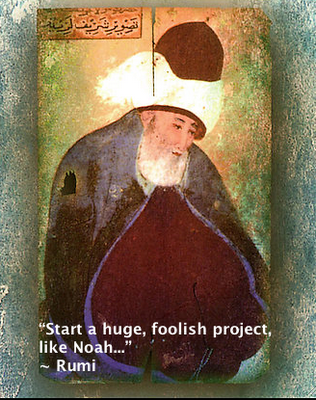
"Start a huge, foolish project, like Noah..."~ Rumi
Rumi quote: The Voice of the Muse: Answering the Call to Write ("Getting Started" Section)Rumi image: source unknown
Published on February 14, 2012 22:55
February 3, 2012
Acts of Surrender 24: To the Other Side of Fear
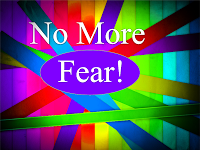 An excerpt from Acts of Surrender: A Journey to the Other Side of Fear, my memoir-in-progress.
An excerpt from Acts of Surrender: A Journey to the Other Side of Fear, my memoir-in-progress.
There's a scene a third of the way through my novel The MoonQuest where the four principal characters discover the true nature of their quest. On the surface, Toshar, Yhoshi, Fynda and Garan are on a journey to restore storytelling to a land silenced by tyranny and, through that, light to a long-darkened moon. In reality, their true enemy is not a brutal king. It's fear.
"All Bo'Rá K'n's power emanates from a single source, from a single weapon: Your fear. Stay together, refuse your fear its power and your mastery will rival his..."Later in the story, Toshar asks the Dreamwalker Na'an whether he will always feel fear clutching at his throat.
"Just as fear has not stopped you from reaching this point in your journey, it will not stop you from continuing, unless you submit to it. Don't submit to it, Toshar. When you do, Bo'Rá K'n grows stronger. Don't give him any more victories in this silenced land."Both scenes have been on my mind in recent days as I've come to realize how much fear still dominates my life.
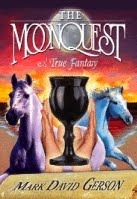 I shouldn't have been surprised. Fear permeates our social and political culture. Just read any newspaper, listen to any newscast, or browse your Facebook or Google+ feed. Or follow the current Republican primary, which has taken political terror-mongering, already a slime sport, to a new, fear-based low.
I shouldn't have been surprised. Fear permeates our social and political culture. Just read any newspaper, listen to any newscast, or browse your Facebook or Google+ feed. Or follow the current Republican primary, which has taken political terror-mongering, already a slime sport, to a new, fear-based low.Yet, I was surprised. Over the past two decades I've faced many of the Bo'Rà K'ns in my life and moved, as Toshar was guided, through to the other side of more fears than I can name.
"Feel your fear, Toshar. Then pass through it to the other side, where your destiny awaits."Today, thanks in part to The MoonQuest , I'm more fearless than I have ever been, and my destiny feels so near that I can graze my fingers against it, even if I can't yet grasp it.
At the same time, I'm closer to the edge than at any other time in my life. I gave up my rented condo 18 months ago and let my car go 14 months ago. My current bank balance, in the low three digits, isn't the lowest it's ever been. But when it has been lower, I've had a job or client or contract...or some prospect. I have none of those today.
Wait, that's my fear speaking...
What I do have in abundance is my faith...not in some bearded deity but in that infinite mind that resides within me, that force, as I put it in a previous Acts of Surrender excerpt, "that has a much clearer sense of what will serve and satisfy my deepest (often hidden) desires than the childish cravings of a limited mind ever could."
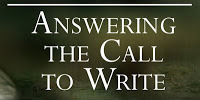 Over the past year and a half, that infinite mind has called on me to commit to my writing, and I have surrendered to the call -- fully, unconditionally and in ways I could never, in my past fear, have conceived.
Over the past year and a half, that infinite mind has called on me to commit to my writing, and I have surrendered to the call -- fully, unconditionally and in ways I could never, in my past fear, have conceived.The result? Two drafts each of The StarQuest book and screenplay, two drafts of The SunQuest screenplay, one draft of The SunQuest book, and a first draft of this Acts of Surrender memoir. Never before have I written this quickly, nor have I ever been this creatively productive. For example, it took me seven months to write a first draft of The MoonQuest and 11 years to complete an initial draft of The StarQuest. I wrote my first draft of The SunQuest book in three weeks.
As well, The Q'ntana Trilogy film projects (The MoonQuest/The StarQuest/The SunQuest), while not moving forward as expeditiously as I might like, are coming together more speedily now than they were before I surrendered to a full-time writing focus.

Through this time, although I have lacked home and car of my own, I have always had a roof over my head and access to a vehicle (important when the nearest shopping/public transit is an hour's walk away). And, somehow, funds have always shown up to cover the remaining necessities. For all those miracles, I have been grateful beyond words.
Then, a few days ago, with disturbingly dwindling resources and no sign of a fresh miracle, I determined that something needed to change -- dramatically and demonstrably. Not my commitment to writing, which remains of prime importance, but chunks of the rest of my life. February, I proclaimed, would be the month when my circumstances would begin to shift, when I would exit survival mode and begin my ascent toward prosperity.
That's when the fear kicked in.
It wasn't anything specific, like fear of success or financial anxiety. Ironically, I was less frightened by my few hundred dollars in the bank than I had been when my balance was triple that. No, it was more insidious and Bo'Rà K'n-like than that.
I didn't even initially identify it as fear. But fear it was. I knew it when I happened on the phrase "refuse your fear its power" from The MoonQuest. The instant I read that, my heart began to race and my stomach knotted up. When I reworded it more personally -- I refuse fear its power! -- my palpitations and queasiness worsened. And when I decided to speak it, mantra-like, in every moment of anxiety, I found myself repeating it, practically nonstop, all day long and amid a discordant medley of physical discomforts.
I'm still repeating it several days later, if somewhat less often.
I realize now that the moment I proclaimed February "dramatic change month," I set in motion all that would be required within me for that change to take place. What's required? That I drill down to the next levels of fears I have carried within me all my life...all my lifetimes, perhaps.
It's not about identifying individual fears and taking steps to reverse them. My individual fears are irrelevant. They are merely symptoms of fear's presence as a pervasive, overarching energy in my life. Of course, it's that same energy that dominates the world outside my psyche. But I can't dissolve it from my outer world unless and until I'm able to dissolve it from my inner world.
At other times in my life, just the prospect of tackling such a deeply rooted issue would have overwhelmed me and filled me with dread. That I'm now able to approach it with more equanimity is, itself, a measure of the distance I have traveled.
Equanimity, yes. Comfort? Hardly. It feels as though I'm (once again) experiencing a radical renovation and overhaul, from the inside out. If fear has been much of the glue that has held me together, letting that fear go is forcing me to make way for new inner structures, adhesives and foundations.
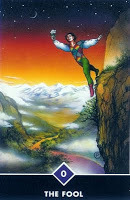 Like all transitions, this one is awkward, sometimes painful and often disturbing.
Like all transitions, this one is awkward, sometimes painful and often disturbing.I'm the mountain lion in mid-leap from one cliff to the next, with no paws touching ground. I'm the Tarot Fool who has already stepped off the precipice. I'm the version of me I once experienced in meditation, who has finally and reluctantly let go of the roof ledge of an old high-rise office structure, only to find himself floating feather-like into the arms of God.
Where will the mountain lion and Tarot Fool find themselves when they land? Will February propel me closer to my destiny? Come month's end, will I have been able to do more than graze destiny's edges with fingertips of yearning? Will my fortunes improve demonstrably through this exercise? I can't in this moment know.
What I do know is that fear is a sticky, swampy morass through which little can move. If I don't reclaim my power and deny Bo'Rà K'n his -- as Toshar did in The MoonQuest and Q'nta and Ben must do in The StarQuest and SunQuest -- then fear will have won.
At the beginning of The MoonQuest, Na'an tells an elderly Toshar that unless he commits his story to parchment -- something he has spent his life resisting -- he will not be free to "move on to other realms, set off on other journeys." I have always seen Toshar's reluctance as an expression of stifled creativity, a clear theme in the book. Now, though, I see that it is his fear that holds him back...just as mine has held me back.
I did not want to write this coda to Acts of Surrender, a manuscript I thought to be complete. As vulnerable as I have allowed myself to be in the book (and in this blog), I did not want go deeper in a public way. Like Toshar, though, I can't separate my fear, my self-expression and my place in the world. And so, like Toshar, I have written the story told to me by the shadows, my shadows.
I see it all now, in the leap of light against dark. The shadows will tell me the story and I will write what I see. I will write until my fingers and beard are black with ink. I will write until the story is told. Only then will I be free to continue my journey......Wherever that journey chooses to take me.
"You either trust or you do not. There is no halfway in between."• Mark David reads an excerpt from The MoonQuest
All quotes are from The MoonQuest: A True Fantasy, (c) 2008 Mark David Gerson. Please credit both book and author when reprinting.
Please "like" these Facebook pages...
• The Voice of the Muse book
• The MoonQuest movie
• The MoonQuest book
• Mark David Gerson
Published on February 03, 2012 16:28
February 2, 2012
Write What You Know? (video)
"Write what you know," the writing guides insist. But what does that really mean?
In this video and in The Voice of the Muse: Answering the Call to Write , I insist that it's not about external expertise (although research can certainly be required sometimes). Rather, it's about writing from that inner place of emotional truth where you already know all you need to know.
Write what you know? If you dare!
Direct to link to the video
Please "like" these Facebook pages...
• The Voice of the Muse book
• The MoonQuest movie
• The MoonQuest book
• Mark David Gerson
In this video and in The Voice of the Muse: Answering the Call to Write , I insist that it's not about external expertise (although research can certainly be required sometimes). Rather, it's about writing from that inner place of emotional truth where you already know all you need to know.
Write what you know? If you dare!
Direct to link to the video
Please "like" these Facebook pages...
• The Voice of the Muse book
• The MoonQuest movie
• The MoonQuest book
• Mark David Gerson
Published on February 02, 2012 21:10
January 26, 2012
Read to Write, Read to Live
 "No matter how busy you may think you are, you must find time for reading, or surrender yourself to self-chosen ignorance."
"No matter how busy you may think you are, you must find time for reading, or surrender yourself to self-chosen ignorance."~ Confucious
There are (at least) three reasons why it's important for a writer to read.
1) The reason set out by Confucious.
Reading expands us as human beings, as conscious beings and as writers.
Writing is most often a solitary act, one that can pull us out of the maelstrom of daily living and into a monastic place of creative retreat. Whether or not we're in the midst of a writing project, it's important to be part of the shared world of creation and imagination inhabited by fellow artists.
Read, listen to music, view art. You'll learn more about the human enterprise and about yourself from those sources than from all the newspapers and magazines on the planet.
It doesn't matter what you read (or view or listen to). Whether you read in your genre or another, you'll connect with the heart of creation and the Creator of heart and art.
2) Craft.
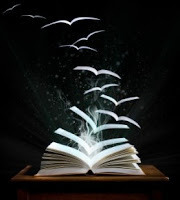 Once again, genre doesn't matter. Depth of topic doesn't matter. What does matter is that you read good writing by accomplished writers.
Once again, genre doesn't matter. Depth of topic doesn't matter. What does matter is that you read good writing by accomplished writers.Osmosis is one of the most powerful learning tools available to the human heart and mind. When we read good writing, we absorb the author's craft and technique. We sense at a deep level what works and what doesn't. Without having to know or understand how or why, without needing to analyze or parse, the power of the words we're reading finds its way into our writing.
You won't be copying. You'll be absorbing, filtering and adapting. You'll be learning -- in the easiest and most fun way imaginable: by doing nothing other than enjoying another's words.
3) Blatant self-interest.
Do you want to be read? Do you want your words to find an audience? If you as a writer aren't reading, what sort of example are you setting for your readers?
The creative/literary community isn't a one-way delivery system. It's a bustling marketplace of ideas and concepts where readers not only learn and grow from writers, but where writers learn and grow from readers and from each other. If we write, in part, to be heard, then we must also be prepared to listen.
Again, genre and subject are less important than engagement, than opening a book -- any book -- and surrendering to the words and imaginings of a fellow artist.
Right now I'm reading Mentor: A Memoir
 , Tom Grimes's eloquent recounting of his friendship and professional relationship with Frank Conroy
, Tom Grimes's eloquent recounting of his friendship and professional relationship with Frank Conroy -- reading for pleasure, learning with pleasure and engaging in the world of words.
-- reading for pleasure, learning with pleasure and engaging in the world of words.What are you reading now? Why is reading important to you? What books have you read this month? What books are you looking forward to reading? Share them here if you choose or on an online readers' communities (Shelfari, Goodreads, etc.). Or find like-minded readers in a book club.
 If you're not reading, visit your local bookstore or public library and discover the words and worlds that are waiting for you on its shelves. Or start with some of the authors whose links you'll find on this blog.
If you're not reading, visit your local bookstore or public library and discover the words and worlds that are waiting for you on its shelves. Or start with some of the authors whose links you'll find on this blog.And if the world of storytellers and storytelling is important to you -- as both writer a reader -- discover what life would be like if it vanished, in my novel, The MoonQuest: A True Fantasy.
Whatever you do, step beyond the walls of your creative enterprise and engage!
Please "like" these Facebook pages...
• The Voice of the Muse book
• The MoonQuest movie
• The MoonQuest book
• Mark David Gerson
Published on January 26, 2012 22:11
January 10, 2012
The Magic of the Open Road: In Creativity & Life
 In the following exchange with another writer in a screenwriting group on Facebook, I spell out why I believe that control is anathema to the creative process -- in both writing and life.
In the following exchange with another writer in a screenwriting group on Facebook, I spell out why I believe that control is anathema to the creative process -- in both writing and life. It's ironic that my Facebook colleague uses the "unmapped drive" example to criticize what he terms the wastefulness of unplanned writing. Going for a random, unplanned drive is the same example I have long used in my workshops and coaching sessions to celebrate the magic of discovery. It's also the basis for what I call "writing on the Muse Stream," which I explore in The Voice of the Muse: Answering the Call to Write.
Other Writer: The problem I think a lot of screenwriters have is not being able to nail down exactly what your ending is before starting. That would be like getting in the car for a weekend getaway and not having any idea where it is you're going... just driving... aimlessly, wasting a whole hell of a lot of gas. This is where the idea of mapping comes in... if you know where you're going, you'll get there, and usually in the most direct line.
MDG: I'm glad you used the analogy of going for a drive without a fixed destination in mind, because that's precisely how I like to go for drives. It's much more fun to get in the car, start it up and see where it will take me. Nearly always, it takes me to a place I never could have imagined going, along a route I never would have thought of taking.
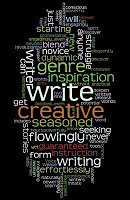 As it turns out, it's also how I write and live my life. It can be scary sometimes. It can certainly feel out of control. But those are the places where magic resides and miracles thrive. And what's life and creativity if not a magical, miraculous journey of wonder and surprise?
As it turns out, it's also how I write and live my life. It can be scary sometimes. It can certainly feel out of control. But those are the places where magic resides and miracles thrive. And what's life and creativity if not a magical, miraculous journey of wonder and surprise?To go back to your "out for a drive" analogy: When I write, I sit in the passenger seat of the experience; the story is in the driver's seat. The story is in the driver's seat because it's its own entity, if you will, one that knows its direction and imperative far better than I ever could. And if I let it take charge, it will introduce me to characters and situations my controlling mind would never have thought up.
As for my life, if I had set a fixed destination and mapped out the journey, I would never have written two award-winning books and three optioned screenplays (in fact, it's unlikely I ever would have been a writer), I probably would not be living in the U.S. (I'm Canadian), and I doubt that I would be a parent...just to name three pretty amazing life-altering experiences.
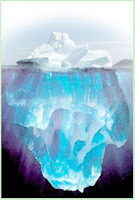 Just like the greatest bulk of an iceberg, my deepest desires and greatest stories often lie largely hidden in the ocean of my unconscious mind. The only way I know to access them is through those leaps of faith that keep my controlling mind out of the process.
Just like the greatest bulk of an iceberg, my deepest desires and greatest stories often lie largely hidden in the ocean of my unconscious mind. The only way I know to access them is through those leaps of faith that keep my controlling mind out of the process.In the end, my directions in writing and life are neither aimless nor energy-wasting. They're simply guided by a wiser part of myself that knows the destination and the way to reach it better than the limits of my conscious mind, as powerful and wonderful as it is, ever could. That's my GPS.
Please "like" these Facebook pages...
• The Voice of the Muse book
• The MoonQuest movie
• The MoonQuest book
• Mark David Gerson
Photo credits: Car, Hub Garage; iceberg, Results Driven Business Coaching
Published on January 10, 2012 09:10
January 1, 2012
The Best to You in 2012
[image error]
May your New Year be blessed with the eyes to see, the heart to feel and the mind to open to the miracles, wonder and love always present for you in every moment.
Let 2012 be the year you access, acknowledge and express the passion that ignites your soul. Happy New Year!

Let 2012 be the year you access, acknowledge and express the passion that ignites your soul. Happy New Year!
Published on January 01, 2012 09:33



